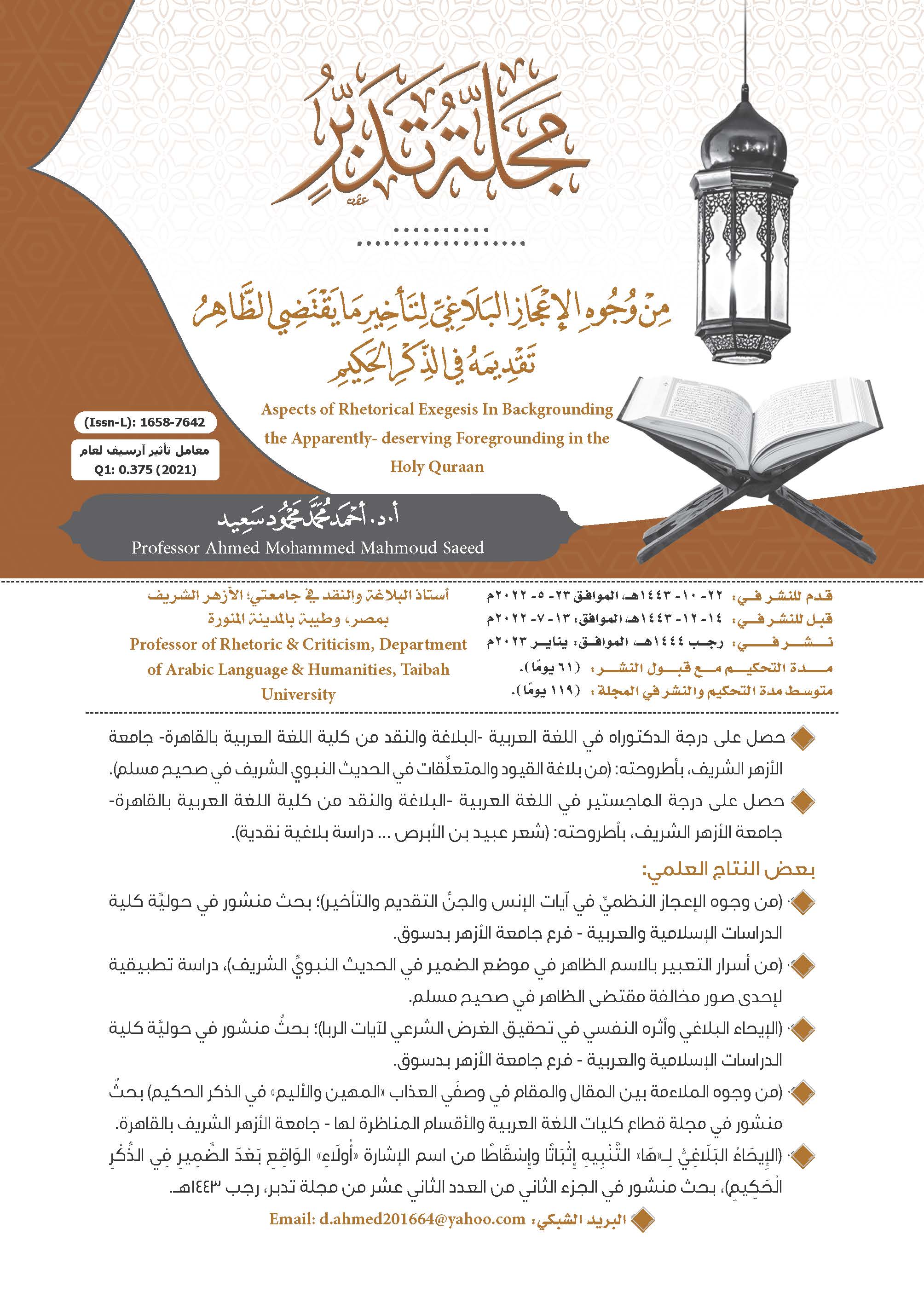- عن المجلة
- قواعد وإجراءات التحكيم و النشر في المجلة
- هيئات المجلة
- العدد الحالي
- الأعداد السابقة
- الأبحاث
- تقارير المجلة
- ملخصات الأبحاث باللغة العربية
- ملخصات الأبحاث بالإنجليزية
- الأخبار
- النسخة الإلكترونية لأعداد المجلة
- فهرس موضوعات المجلة حسب السنوات
- فهرس موضوعات المجلة حسب البلدان والجنسيات
- راسلنا
القائمة الرئيسية
عدد المتواجدين الان
| المتواجدين الان : | 5 |
| الزوار : | 5 |
| الأعضاء : | 0 |
ملخص بحث: من وجوه الإعجاز البلاغي لتأخير ما يقتضي الظاهر تقديمه في الذكر الحكيم

مستخلص بحث:
من وجوه الإعجاز البلاغي لتأخير ما يقتضي الظاهر تقديمه في الذكر الحكيم.
للباحث: أ.د. أحمد محمد محمود سعيد.
صفحات البحث في العدد:188:8.
الدولة: مصر.
موضوع البحث:
تَتَبُّعُ الإشارات البلاغية الداعية إلى مُخالفة الأعراف القاضيةِ بتقديم الأهمِّ الذي يقتضي الظاهر تقديمَه على غيره في الذِّكر الحكيم، وبيان تلك اللطائف قَدْر الإمكان.
مشكلة البحث:
تكمن مشكلة البحث في تلك المخالفة الصريحة لِما استقرَّ في المِزاج العربي من تقديم ما بيانُهُ أهمُّ لهم، وهم ببيانه أعنَى.
أهداف البحث: محاولة ترجمة اللطائف البلاغية الكامنة وراء تلك الظاهرة التركيبية؛ بما يكشف النقاب عن أحد وجوه الإعجاز القرآني الباهرة.
منهج البحث:
ينتهج البحثُ المنهجَ الوصفيّ التحليليَّ، الذي يستثمر نظريةَ النَّظْم، ويُسائل الخصيصة التركيبية في سياقها، منتفعًا بِشُمولية الثقافة الإسلامية والعربية، وغزارة التراث الخادم في ذلك.
من أهم نتائج البحث:
* أنَّ الذكر الحكيم قد يُؤْثر تأخيرَ العُنصر الأَوْلى بالتقديم؛ إبعادًا له عن رائحةِ دِلالةٍ لا تُلائم مرتبتَه، وإقصاءً له عن ظِلالِ أجواءٍ لا تُناسب رُتبته.
* أنَّ الذِّكر الحكيم قد يُؤخِّر الأهمَّ لِيُلحقه بما يُناسبه بُعَيْدَه؛ فيُحقِّق بذلك تَوازنًا في الأغراض الشرعية والإشارات البلاغية بين المقدَّم المهمِّ والمؤخَّرِ الأهمِّ.
* أنَّ الذِّكر الحكيم قد يُؤخِّر الأهمَّ -عقيدةً أو ديانة أو غيرَهما- تدرُّجًا في الوصول إليه عَبْر الأدْنى مِنه رُتبةً المقدَّمِ عليه؛ ليكون المقدَّمُ الأدنى تهيئةً له ووُصْلةً إليه.
* أنَّ تأخيرَ الأهمِّ -لفظًا- يؤول به عند التحقيق إلى تقديمه رُتبةً في بابه، بل إنَّ الإبقاء على تَقدُّمه رُتبةً لا يتحقَّق إلا بتأخيره لفظًا في ذلك السياق.
التوصيات:
يوصي البحثُ طلابَ العربية الجادِّين بِتَتَبُّع الظواهر الأسلوبية المخالِفة لِما استقرَّتْ عليه أعرافُ اللسان العربي -في النصوص الفصيحة عمومًا، وفي النصوص الشرعية خصوصًا- إذ تتجلى البراعةُ وتزهو البلاغة على وجهها الأنورِ، ويتحقق مَتَاع الذائقة اللغوية لدى الباحث في تلك المخالَفةِ اللافتة بدرجةٍ أكبر.
كلمات مفتاحية: بلاغة، التأخير، التقديم، الذكر الحكيم، الإعجاز.
Aspects of Rhetorical Exegesis
In Backgrounding the Apparently- deserving Foregrounding in the Holy Quraan
Professor
Ahmed Mohammed Mahmoud Saeed
Professor of Rhetoric & Criticism,
Department of Arabic Language & Humanities, Taibah University
Abstract
Subject: tracing rhetorical signs that deviate from the norm of prepositioning the most important in Holy Quraan, and explaining these subtle phenomena.
Research problem: the research problem lies in this explicit deviation from the stylistic features of Arabic which preposes the most important.
Research Objectives: interpreting these rhetorical subtleness to uncover the exegesis of the Quraan.
Research Methodology: the research adopts the analytical approach, employing the Nazm theory, exploring the feature in its context, making benefit of the richness of the Islamic culture.
Research Findings:
* Quraan my prefer postposition an element which has priority to be foregrounded to avoid collocational clashes.
* Quraan may postpose the most important element in the sentence to achieve good collocational usage to realize balance in the lawful purposes and rhetorical signs between the preposed and postposed.
* Quraan may postpose the most important, from an Islamic point of view, to be introduced by the least important.
* postposing the most important in its sentencial order reveals under scrutiny that it is preposed in its class, and this non- literally prepositioning can not be achieved without this sentencial order.
Recommendations: Students of Arabic are highly recommended to trace these unconventional stylistic phenomena in the classical Arabic texts in general, and in shariah texts in particular. The eloquence of the usage is crystal clear in these cases and the researcher can enhance his/her linguistic skills.
Keywords: rhetoric, preposition, postposition, Quraan.
إحصائيات الموقع
| الزوار : | 736227 | |
| الأخبار : | 102 | |
| الأعـضـاء : | 0 | |
ابحث داخل الموقع
الاســتفتـــــــــاء
القائمة البريدية
الصور المتحركة




















